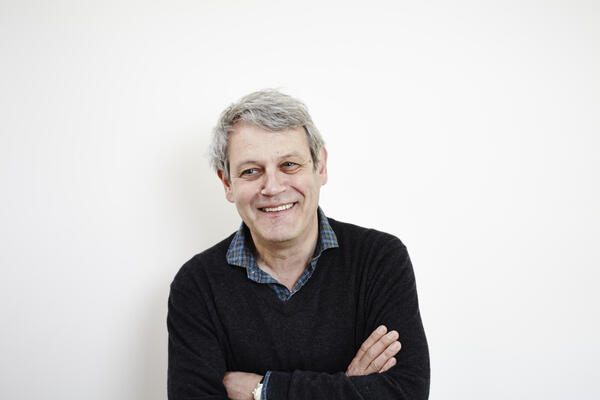“It is about not excluding anyone, welcoming strangers and being helpful and empathetic.”

© Liam Jackson
Axel Scheffler is among the most well-known children's book illustrators in the world. His books - from ‘The Gruffalo’ to ‘Pip and Posy’ - reach children in over a hundred languages. In October, he will be speaking at the Frankfurt Kids Conference about the responsibility of children's books in a fragile world. In this interview, he explains why kindness is not a naive idea, how subtly stories show attitude - and why his new book ‘Welcome’ aims to champion friendship and togetherness.
1. Mr Scheffler, ‘The Gruffalo’ has reached millions of children worldwide - even in countries where children's books are increasingly being censored. What does this mean for you as an illustrator? How do you deal with the knowledge that pictures and stories can be politically appropriated or suppressed?
The story of the mouse and The Gruffalo has a certain subversive element: a small, weak, threatened creature outwits a large, strong, threatening creature and saves its life with the help of a white lie. The monster isn't evil, it's just hungry. Apparently, nobody has taken offence at this message.
Of course, I am very concerned about the censorship of children's books, especially in the USA, even though my books have not yet been affected. How do I deal with this knowledge? I am aware of it, like so many bad developments in recent times, and feel relatively powerless.
I hope that my books have an impact on children - not only that they get children to read, but also that the often rather subtle messages of Julia Donaldson's books get through. This is because Julia's stories are often about helping someone in need, showing solidarity and overcoming boundaries (‘There's still room for cats and dogs’, ‘Giant Rick’, ‘The Schnetts and the Schmoos’).
The new book ‘Welcome: A book about friendship’ (publication date: 17 July 2025; published by Beltz) is even more directly about not excluding anyone, welcoming strangers and being helpful and empathetic. The proceeds will go to the charity organisation ‘Three Peas’, which primarily cares for refugees in Greece. I hope that the book will also set an example in societies where the term ‘unwelcome’ is used.
2. You have been working internationally in London for decades - the Gruffalo books are published in over 100 languages. How does this change your view of topics such as diversity, inclusion or censorship in children's literature?
Of course, I can't follow exactly how my books are doing in all these countries. However, my impression is that in the UK, publishers' efforts to promote diversity and inclusion were more pronounced earlier on than in Germany, for example.
My ‘Pip and Posy’ books are very successful in China and sell millions of copies. This creates a bit of a dilemma, of course, because China is a country with many human rights violations. I would probably actually prefer my books not to be published there. However, as there have been efforts in the People's Republic in the past not to publish Western books - in other words, to censor them - there are good arguments in favour of publishing the books there. The values that the ‘Pip and Posy’ books convey will hopefully also have a positive influence on the children living there.
3. Many of the characters in the books - from the witch to the Gruffalo - are outsiders. Why are you drawn to these characters? And what do they say about our world, especially nowadays?
As I am not the creator for the themes of the books, the question should probably go to my author Julia Donaldson. The books are mostly fairytale-like and often draw on the characters from these stories. As with fairy tales, human and current issues can be hidden in the stories. The witch and Gruffalo can be found at different ends of the spectrum: The witch is, after all, a very nice, helpful character whose kindness is rewarded when the animals rescue her from the dragon (also hungry, not evil!) in dire need. The Gruffalo is a life-threatening danger for the mouse - but she can save herself through her trickery and eat her nut in peace.
4. Children's books can comfort, explain and provoke. What do you think are their most important qualities in a fragile world?
The world has always been quite fragile and that is also a very relative term. For some children, the world is much more fragile than for others. I think that books, especially children's books, are enormously important. They enable children to orientate themselves in this world, to experience it - and in all sorts of different ways. Books enrich children's lives and also serve to convey values. I believe that literature can provide comfort and stability in a fragile world. Studies have also shown that children's books and reading can help individuals to lead a better, more opportunity-filled life and also offer more stability in the face of fragility.
5. What do you personally hope to gain from your keynote speech at the Frankfurt Kids Conference? What would you like to emphasise to the international professional audience?
I suspect that the audience does not need to be convinced of the value of reading - so I am ‘preaching to the converted’. I hope that by sharing my experiences at the keynote I am not fuelling despair about the current state of the fragile world - but perhaps having the opposite effect: We all need to try to do a little bit in our own sphere.
The Interview was conducted by Frank Krings, PR-Manager at Frankfurter Buchmesse.
More about Axel Scheffler: https://axelscheffler.com/(opens in a new window)
More information about the Frankfurt Kids Conference: https://www.buchmesse.de/en/highlights/professional-programme/special-topics/frankfurt-kids
